In 1980, roughly 1% of children were classified as obese in the developing world. Today, it is estimated that one out of every eight individuals globally is affected by obesity. The number of adults with obesity has more than doubled since 1990, while adolescent obesity has increased fourfold. Additionally, there were 2.5 billion overweight adults (18 years of age and older), with 890 million of them living with obesity (WHO). Is junk food addiction responsible?
Of all adults aged 18 and above, 43% are overweight, and 16% are affected by obesity. Moreover, 37 million children under the age of 5 will be identified as overweight in 2024. The number of overweight children and adolescents aged 5–19 years was over 390 million, including 160 million who were living with obesity. In the United Kingdom, 23% of Year 6 children are classified as obese, and over 35% of teenagers entering adulthood are overweight. In Australia, the problem is much worse, with 25% of children aged between 2 and 19 living with overweight or obesity and 10% suffering from severe obesity and the numbers only go up each year.
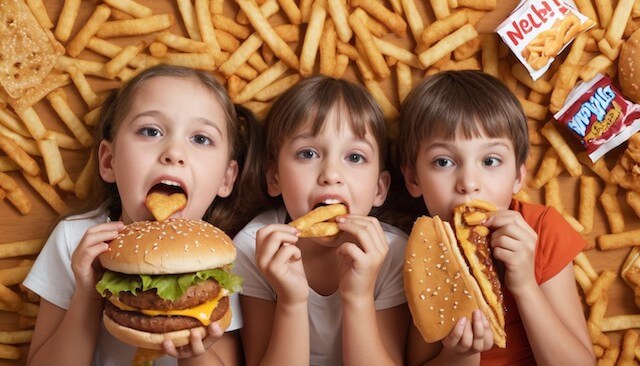
Spending more time on digital devices, a lack of causal engagement between peer groups, or general exercise it appears there is an epidemic no one wants to talk about.
Obesity has become a global health crisis, affecting millions of people worldwide. It is a complex condition, with various factors contributing to its development. While genetics and lifestyle choices play a role, one of the significant causes of obesity is the consumption of junk food. Junk food refers to processed and unhealthy foods high in calories, sugar, and unhealthy fats. The excessive intake of these foods leads to weight gain and, ultimately, obesity.
What is the role of junk food in the obesity epidemic?
According to recent research, these irresistible dishes are not just meant to be tasty, but they are also highly addictive—to the point that some specialists are labelling the unquenchable desire as a genuine mental disorder.
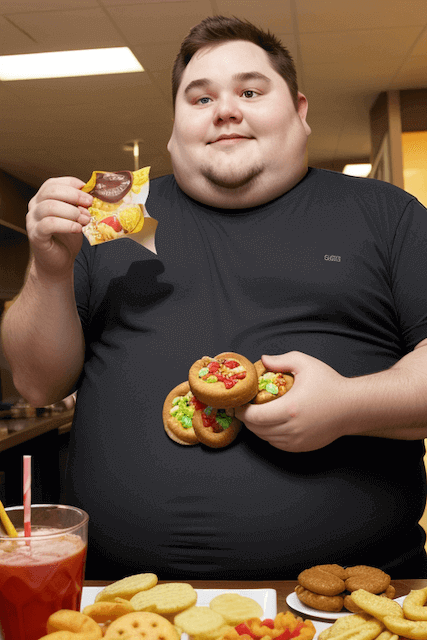
Junk food has become increasingly popular over the years due to its convenience and addictive nature. Fast food chains and processed food manufacturers have mastered the art of creating addictive flavours that keep us coming back for more. These foods are often high in empty calories, lacking essential nutrients, and loaded with sugar and unhealthy fats. The overconsumption of junk food, combined with a sedentary lifestyle, is a recipe for weight gain and obesity.
Exploring the Concept of Food Addiction:
Food addiction is a controversial topic, but many researchers believe that it is a real condition. Food addiction refers to the compulsive consumption of certain foods, often high in sugar, fat, and salt. These foods activate the brain’s reward system, releasing feel-good chemicals such as dopamine. Over time, individuals develop a dependency on these foods, leading to cravings and an inability to control their consumption.

In the age range of 5 to 19 years, children are considered to be overweight or obese based on the following criteria:
According to the WHO Growth Reference median, being overweight is defined as having a BMI-for-age that is 1 standard deviation higher than the median, while obesity is classified as having a BMI for age that is 2 standard deviations higher than the median.
The following text has been rephrased to eliminate any potential plagiarism by altering its structure while keeping its context and semantic meaning intact. Please note that the markdown formatting has been preserved.
In 2022, approximately 16% of individuals aged 18 years and older were classified as obese globally. This number has more than doubled since 1990, indicating a significant increase in the worldwide prevalence of obesity.
According to statistics from 2022, approximately 37 million children below the age of 5 were experiencing overweight issues. While overweight was previously seen as a problem in high-income countries, it is now becoming prevalent in low- and middle-income countries. In Africa, the percentage of children under 5 with overweight problems has risen by around 23% since 2000. Asia was home to nearly half of the children under 5 who were overweight or obese in 2022.
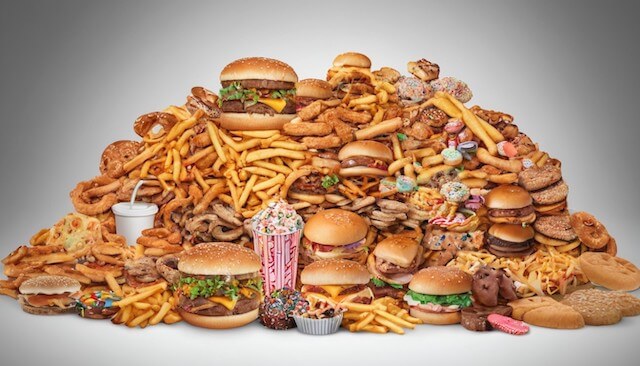
In the year 2022, a staggering number of 390 million individuals between the ages of 5 and 19 were found to be overweight. The rate of overweight, which includes obesity, has significantly increased from 8% in 1990 to 20% in 2022 among children and adolescents aged 5–19. This rise has been observed in both genders, with 19% of girls and 21% of boys being classified as overweight in 2022.
In 1990, only 2% of young individuals aged 5–19 were classified as obese, which accounted for 31 million individuals. However, in 2022, the percentage of children and adolescents living with obesity will rise to 8%, representing a staggering 160 million young people.
The Addictive Nature of Fast Food
Fast food is famous for its addictive nature, easy access and affordability. The combination of high levels of fat, sugar, and salt creates a perfect storm for addiction. These ingredients stimulate the brain’s reward centre, triggering pleasure and cravings. Additionally, fast food establishments use marketing tactics to entice consumers, such as bright colours, catchy jingles, and enticing smells. All these factors contribute to the addictive nature of fast food, making it incredibly difficult for individuals to resist.
Numerous countries with low and middle incomes are confronted with the dual challenge of malnutrition.
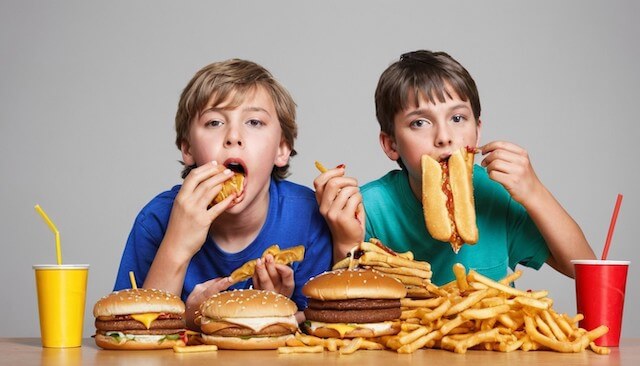
Despite ongoing efforts to address infectious diseases and undernutrition, these nations are also facing a sharp increase in noncommunicable disease risk factors, including obesity and being overweight.
It is not uncommon to observe the coexistence of undernutrition and obesity in a single country, community, or household.
In low- and middle-income countries, children face a higher risk of inadequate nutrition during the prenatal, infant, and young child stages. Additionally, they are often exposed to cheap, high-fat, high-sugar, high-salt, energy-dense, and nutrient-deficient foods. These eating habits, combined with decreased physical activity, have led to a significant rise in childhood obesity, while the issue of undernutrition remains unresolved.
The Hidden Dangers of Sugar Addiction:

Sugar addiction is a prevalent problem in today’s society. Consuming excessive amounts of sugar found in junk food can lead to a myriad of health issues, including obesity. When we consume sugar, our blood sugar levels spike, causing a release of insulin to manage the excess glucose. Over time, this can lead to insulin resistance, a precursor to type 2 diabetes. Sugar addiction also wreaks havoc on our metabolism and increases the risk of heart disease and certain types of cancer.
How Junk Food Addiction Affects Physical Health:
According to scientists, consuming junk food increases the chances of developing 32 diseases and health conditions, including death.
Some scientists believe there is a distinction between various types of ultra-processed foods, and some may even have potential health benefits.
However, due to the lack of a standardised definition, certain companies and producers argue that their products do not fall under the category of ultra-processed.
There may be assistance available for individuals addicted to unhealthy food.
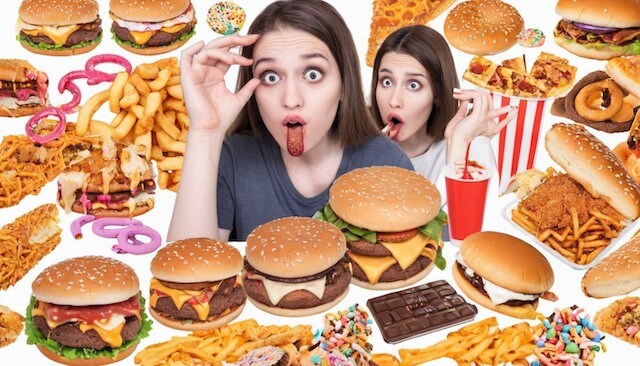
Recent research suggests, these irresistible dishes are not just meant to be tasty, but they are also highly addictive—to the point that some specialists are labelling the unquenchable desire as a genuine mental disorder, as reported by the Wall Street Journal. The link provided by the New York Post discusses the connection between consuming ultra-processed foods and experiencing psychological distress.
According to Ashley Gearhardt, a prominent researcher in the field of food addiction and professor of psychology at the University of Michigan, signs of “ultra-processed food use disorder” or “highly-processed food use disorder” may include strong desires and challenges in reducing consumption, as well as withdrawal symptoms like irritability and agitation when attempting to decrease intake.
A variety of fast-acting carbohydrates, including fries and soda, can have detrimental effects on one’s appearance, skin, heart health, and dental health. This is why ultra-processed foods, such as chips, certain cereals, and packaged snacks, may be connected to alterations in our cognitive abilities, memory, and emotions.

According to numerous studies, ultra-processed foods, including potato chips, certain cereals, pre-made condiments, and packaged snacks, have been found to have negative effects on the body. Furthermore, as more evidence emerges on the connection between the brain and gut, experts suggest that food can also influence our mental well-being, potentially contributing to mood disorders, sleep disturbances, and learning difficulties, as well as cognitive decline and dementia.
According to research conducted in 2017 and published in PLoS One, individuals who consumed a breakfast high in saturated fat and added sugar for four consecutive days experienced a decline in their performance on certain learning and memory tests. In contrast, those who had healthier breakfasts did not show any changes in their performance.
Junk food addiction takes a toll on our physical health.
The excessive intake of unhealthy fats and sugar leads to weight gain and obesity. This, in turn, increases the risk of developing various health conditions, including type 2 diabetes, high blood pressure, and heart disease. Additionally, a diet high in junk food often lacks essential nutrients, leading to nutrient deficiencies and a weakened immune system. The physical consequences of junk food addiction are severe and far-reaching. The estimated cost and burden of disease on the health system, overall productivity levels far exceed alcohol, drugs, and all other health problems in the hundreds of millions, if not billions, of dollars. It affects not just the individual affected by an unhealthy relationship with food but also their family members, friends, and wider community. In Australia, most knee reconstruction surgeries relate to too much weight being forced onto the lower body.
The Psychological Impact of Food Addiction
According to another study, which was published in the Journal of Affective Disorders in March 2023, individuals who consume high levels of ultra-processed foods have an 80% increased risk of experiencing depression. This study challenges the belief that these foods are considered “comfort food.”
Food addiction not only affects our physical well-being but also has a significant impact on our mental and emotional health. Individuals struggling with food addiction often experience feelings of guilt, shame, and loss of control. This can lead to low self-esteem and a negative body image. The constant cycle of bingeing and restricting further exacerbates these psychological issues, creating a vicious cycle that is challenging to break.
Consuming ultra-processed foods triggers the brain’s reward system, which includes pleasure, motivation, and learning, leading to a heightened desire for them.
According to Gearhardt, the consequences observed are comparable to those experienced by individuals who consume addictive substances such as nicotine and alcohol, as reported by a study published by the New York Post in 2023.

Breaking Free From Junk Food Addiction: Tips and Strategies
Breaking free from junk food addiction is no easy task, but it is possible with the right strategies and support. Here are some tips to help you on your journey towards a healthier lifestyle:
- Identify trigger foods: Take note of the foods that trigger your cravings and try to avoid them as much as possible.
- Build a Support System: Surround yourself with people who support your goals and encourage healthy eating habits.
- Plan and Prepare Meals: Set aside time each week to plan and prepare nutritious meals to avoid relying on junk food.
- Find Healthy Alternatives: Replace unhealthy junk food with healthier alternatives such as fruits, vegetables, and whole grains.
- Practice Mindful Eating: Pay attention to your body’s hunger and fullness cues and eat with intention and gratitude.
- Seek Professional Help: Consider reaching out to a registered dietitian or therapist specialising in food addiction for guidance and support.
Seeking Professional Help for Food Addiction:
If you find yourself unable to break free from your junk food addiction, seeking professional help is an excellent option. Registered dieticians and therapists can provide the necessary guidance and support to overcome food addiction. They can help you develop personalised meal plans, address underlying emotional issues, and provide coping strategies to manage cravings and maintain a healthy lifestyle.

Taking Steps Towards a Healthier Lifestyle
The body positivity movement advocates for the idea that one can be healthy at any body size.
When it comes to children, those in charge often seem to prefer discussing eating disorders rather than overeating.
The concept of “fat positivity” is unrealistic, according to a recent article published on UnHerd. The author argues that promoting acceptance and celebration of larger body sizes is not only unhealthy, but it also ignores the significant health risks associated with obesity.
Misconceptions about the root cause of eating disorders often contribute to the issue. While images of extremely thin models in magazines can sometimes serve as a trigger, anorexia, particularly in severe cases that require hospitalisation, is not solely driven by body image concerns. According to a former colleague who worked in an inpatient unit for eating disorders, the environment was filled with complex dynamics involving troubled family relationships, past traumas, and obsessive tendencies.

The root causes of obesity are most likely complex and transcend standard biopsychosocial screening instruments. Basically, the data suggests that, rich or poor, black or white, obesity tends to affect most communities equally. Treatment options and access to higher levels of care muddied the demographic waters, much like all known diseases.
It was once thought to be well-known that there are differences in socio-economic status, with children living in the most deprived areas having a higher likelihood of being obese compared to those in affluent areas.
The concept of “food deserts” was once used to explain this phenomenon, suggesting that limited food options in areas with small convenience stores that mainly stock unhealthy foods could contribute to obesity.
However, recent studies have shown this to be a misconception, as lower-income families tend to shop at larger, more affordable supermarkets just like everyone else. Additionally, obesity rates among children in wealthy areas remain high, with 13% of them being obese by the end of primary school.
Parents’ choices play a significant role in predicting obesity in children, making it a more dependable factor compared to other predictors. As adults, they not only influence their own bodies but also their children’s.
This can be seen in their eating habits, with unhealthy food choices at home being reflected in their children’s diets. The high prevalence of overweight and obese adults in the UK, which stands at 63% and 28%, respectively, is a contributing factor to the current crisis of child obesity.
The devastating impact of junk food addiction on our physical and mental health cannot be understated. Obesity rates continue to rise, and it is crucial to address the root causes of this epidemic. By understanding the addictive nature of junk food, we can take steps towards breaking free from its grip. With the right strategies, support, and professional help, it is possible to overcome food addiction and lead a healthier, more fulfilling life. Let’s make a commitment to prioritise our well-being and embrace a lifestyle that nourishes our bodies and minds.

